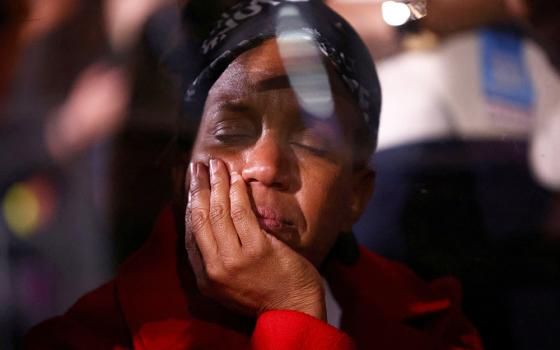One is reluctant to use the word “worldview” to describe the rambling, incoherent comments Donald Trump made at his meeting with the New York Times editorial board. Anyone who seriously thinks that the foreign policy of the United States should be entrusted to this man is not thinking seriously.
Many of us, including Pope Francis, have warned against the dangers of ideology, and that is one charge that cannot truly be laid at Mr. Trump’s feet. An ideology is a worldview become resistant to new information, unsupple in application, totalizing in its reach, and, just so, dangerous. An ideologue is hellbent on making circumstances conform to his theories and is willing to go all-lengths to pursue his idealized vision. Ideologues are dangerous, to be sure, but Trump poses a different kind of danger. Having no capacity for reflection, no eagerness to make one’s ideas cohere, no inclination to test one’s ideas against reality, to rely thoroughly on instinct, this is the Trump danger.
Trump’s danger is also that of the ingénue: There can be an initial attraction, but whatever relationship ensues is likely to harm both parties. Trump, for all his bravado, might be easily manipulated, not necessarily by a foreign menace, but an advisor who successfully strokes Trump’s ego (and there is much to stroke), and proffers horrible, ideologically-driven advice, or advice that is driven by some dark psychological needs that might be more dangerous than ideology.
Trump appears incapable of concentrated reflection. “In life people have first to be taught ‘Concentrate on essentials.’ This is no doubt the first step out of confusion and fatuity; but it is only the first step,” wrote Churchill, reflecting on the American preference for clear-cut, logical thinking about war plans. “Confusion and fatuity” well describe Trump’s rants on policy, foreign and domestic. But, Trump’s problem appears not merely that he has not learned this first step of concentrating on essentials. No, he seems incapable of concentrating at all. His discussions of issues resemble stream of consciousness rambles of the kind found in James Joyce’s “Ulysees,” except for the utter absence of genius that Joyce brought to his task. Listening to Trump is like listening to an infant scream: The baby wants to be fed and Trump wants to be the center of attention. In both cases, the noise is painful. At least the baby will grow out of its screams.
Mr. Trump said to the editorial board: “I'm not isolationist, but I am 'America First.' So I like the expression. I'm 'America First.’” He did not appear to know the ugly resonance of the phrase. It is shocking that anyone would invoke it, but to see a Republican presidential candidate invoke it betrays a level of ignorance that astounds. Pat Buchanan used the phrase when he challenged George H. W. Bush for the Republican nomination, more evidence of the fact that the problem today is not Trump himself, or at least not primarily Trump, but the many voters who find this sort of nativism appealing.
Ironically, former Secretary of State Hillary Clinton is also distrusted, in part, because she is so non-ideological. The suspicion is that she would stomp on any belief or conviction if it proved politically advantageous to do so. That may be true, or it may not be true, but at least Clinton would bring a degree of knowledge and sophistication to the job she seeks. Knowledge and sophistication are not everything: The team of Wall Street economic advisors that surrounded her husband and President Obama have plenty of both. But, in a dangerous world, having someone who has weighed the relative, and often competing, values at stake in different situations is a kind of insurance, not that the right course will be taken, but that no foolhardy course will be taken. All world leaders are called upon to make decisions the outcomes of which are unknowable in advance. Narrowing the range of options, however, being able to assess pros and cons, understanding that world actors do not view the world as we in the U.S. do, all these make for decisions that may prove wrong before history, but are usually not catastrophic. Hearing Mr. Trump speak in favor of nuclear proliferation, and speak blithely about it too, reminds us that powerful people can invite catastrophe.
It is painful to read the transcript of the interview with the New York Times editorial board. But, it is essential reading. This man is the leading contender to be the Republican presidential nominee and while he trails Clinton in almost all polls, no one knows what events might give his candidacy a boost. If the economy were to slow down significantly, or if there were another terrorist attack in the U.S., it is hard to know how the American people will react. All candidates, even ones as seasoned as Clinton, are capable of falling on a banana peel.
The deeper lesson of his rant is that there is something actually worse than ideology: The absence of an ability to reflect upon ideas. He tosses foreign policy options around the way a baby throws its toys in the cradle. If you went to dinner with him, what would you discuss? Does he read? He is not stupid, just woefully uninformed and so obviously uninterested in becoming better informed. Are other business leaders similarly bereft of intellectual coherence? Has the greed of the superrich not only crushed the middle class but also crushed their own intellects? Or is Trump an anomaly within his class? The transcript left me with such questions, but it conclusively puts to rest any idea that this man should become president.




